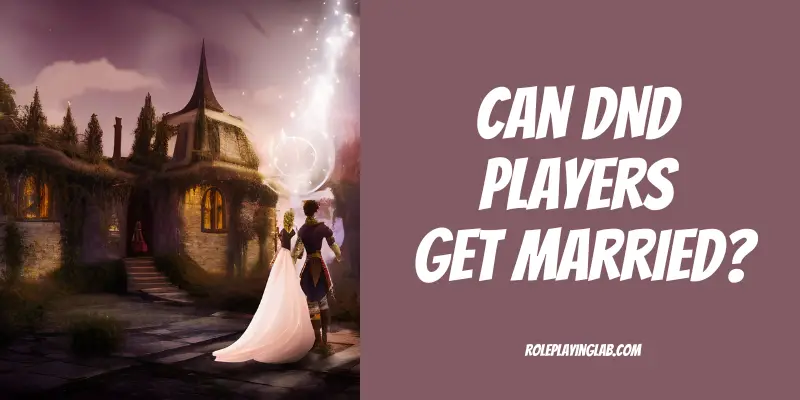Are you considering tying the knot with a fellow Dungeons & Dragons (DND) player?
If so, you may be wondering, “Can DND players get married in DND?“
DND players can get married in DND. Marriage can be integrated into the plot of the campaign, make a character more colorful, and introduce fun into the game. Using a Ceremony spell, a married player can gain +2 AC for 7 days.
In this article, we’ll explain exactly how it can be done and provide some helpful tips for having the perfect DND wedding.
So, prepare your dice and get ready to say, “I do.”
Can DND Players Get Married?

Yes, DND players can get married in the game.
There are no rules in DND against getting married. Most players, however, don’t get married because the focus is on solving puzzles, exploring dungeons, and defeating dragons.
But, should a player want to get married, it’s definitely possible.
In fact, Xanathar’s Guide To Everything introduced a Ceremony spell that can be applied to weddings.
Here is what the spell says about weddings:
You touch adult humanoids willing to be bonded together in marriage. For the next 7 days, each target gains a +2 bonus to AC while they are within 30 feet of each other. A creature can benefit from this rite again only if widowed.
We’ll come back to that spell later but, for now, it’s enough to show you that DND players can get married.
Why Get Married in DND?
Here are a few reasons a character might get married in DND:
- To gain access to political alliances or favors
- To increase a character’s social ranking
- To secure an inheritance for a spouse or children
- To honor a family tradition
- To gain access to magical items or abilities from the spouse’s family
- To ensure a safe line of succession between two noble families
- To make their character more fun and colorful
- To integrate external romance (players who are dating) into the game
Ultimately, getting married in DND is a fun and unique way to deepen the bonds between players and the characters they play.
How To Get Married in DND
In order to get married in DND, the players must both agree to the union and make sure the DM (Dungeon Master) approves.
The DM will also need to adjudicate the legal and social effects of the marriage.
This means negotiating the merging of households, lands, titles, and so on.
Once the DM approves, the players can move forward with their in-game wedding.
Depending on the campaign setting and the players’ preferences, a traditional ceremony can be held with the DM officiating via a Non-Player Character (NPC).
Calling back to the Ceremony spell from earlier, a spellcaster can perform the magic ritual.
Additionally, the players can decide on the type of ceremony, what type of clothing to wear, and who the guests should be.
The DND wedding can also be as extravagant or as simple as the players and DM agree to.
With the right preparations, the players can have a memorable and unique wedding experience.
With the proper preparations, the players can have an unforgettable D&D wedding and create a lasting in-game memory.
What Happens When a Character Gets Married?
Once the vows have been exchanged and the couple is officially married, it may have a huge impact on their characters.
Depending on the game, married characters may receive bonuses (more on this in a moment).
Bonuses such as increased stats or special abilities. Additionally, married characters may be seen as more trustworthy in the community, which could lead to new adventures and opportunities.
On the other hand, married characters may also face certain obligations and responsibilities.
Responsibilities include making sure their spouse is taken care of or parenting children.
Each circumstance is going to be unique.
Consider this list of game-changing ideas:
- Getting married might give the character an extra layer of motivation.
- It can limit a character’s movement in the world (if they decide to stay with their spouse and not travel).
- It can add complexity to any pre-existing relationships, loyalties, and/or rivalries within the party as they learn more about the new family member.
- A marriage could cause a shift in dynamics, depending on whether or not the other party members accept (or even know) the new addition to the party.
- New characters might be introduced as part of extended family members.
- Possible side quests may arise from accepting tasks from family members who may need help.
- Adventurers can find themselves in difficult moral dilemmas when dealing with local customs that don’t always align with their own beliefs and values.
- Characters will be forced to consider how their marriage affects those around them – including allies, enemies, and bystanders who may be affected by any actions taken due to personal connections with their spouse.
- The allure of romantic affection might become a temptation for one or more of the party’s adventurers, adding turmoil and drama that could potentially tear apart relationships formed within the group.
- In some cases, getting married could open up beneficial opportunities for trade or travel as well as being able to call upon favors from different people associated with your spouse’s family or social circle.
- There can be a real opportunity for interparty conflicts if there are ideals and differences between what each individual wants out of life.
- Getting married could change how much time is devoted to adventuring since spouses and young kids require additional resources such as food, clothing, and shelter.
What Happens When a Character Gets Married Through a DND Ceremony Spell
As promised, let’s explore the potential benefits of the Ceremony spell.
For reference, if your character gets married through the Ceremony spell, you get a +2 to your AC for 7 days as long as your spouse is within 30 feet of you.
That’s pretty cool.
It’s motivation to keep your spouse in your party for at least a week of in-game time.
You can only repeat this spell – and the bonuses – if you are widowed.
Ok, that’s a fair limitation. But, let’s see how we can overpower this idea. Just for fun.
There are a few scenarios I can imagine:
- Extending AC – Every seven days, your character marries, gets widowed (intentionally or unintentionally, if you get my drift), then undergoes the spell/ritual.
- Multiply AC – The spell does not specify how many wives or spouses you can marry or that the AC bonus relies on the living status of your spouse. Therefore, you could get married to as many people as can fit into a 30-foot radius (let’s say a conservative 90 people). All but 1 spouse would need to pass away somehow. In this very unlikely case, your AC would skyrocket by +180.
- Superboost AC – If you married an army of tiny creatures (say a few inches tall), you could fit even more spouses in your 30-foot radius. Continue to overload your AC by stacking spouses vertically into the air and underground.
Is any of this realistic? Not at all.
Would any DM let this fly? Not a chance.
DND Wedding Tips and Ideas
With a bit of creativity and a few house rules, your characters can have the perfect wedding.
Here are some global tips on how to have a memorable and enjoyable D&D wedding:
- Decide on the location. Depending on the campaign, you can have your wedding in a temple, a magical garden, etc.
- Create a wedding ceremony. Have your DM help you come up with a unique ceremony that fits with the game’s setting and storyline. This can involve NPCs, rituals, or even special effects.
- Make the night special with a feast or a ball. This is a great way to celebrate the newlyweds and make the night memorable for everyone.
Now, check out these tips for a DND wedding:
- Create a customized wedding quest for the players to complete
- Incorporate magical elements into the wedding ceremony, such as spellcasting or burning incense
- Have the bride and groom walk down an aisle made of special stones or ornamental plants native to the world or setting
- Choose a unique venue for your wedding, like an ancient ruin or enchanted forest
- Invite nonplayer characters to join as guests, such as dragons and demons
- Have bards tell stories during dinner with songs tailored to each couple’s story
- Use magical items like rings and swords to exchange vows
- Perform a traditional dance or two after dinner to celebrate the newlyweds
- Send guests off with special gifts that are in line with the theme, like potions or vials of rare herbs
- Give away customized tokens at the wedding that represent love and kindness
- Arrange pre/post-wedding excursions for guests, such as exploring ancient ruins or fighting monsters
- Include puzzles along each step of the way for bridal party quests (e.g., solving a hidden riddle)
- Hold special events during each night leading up to the wedding day (e.g., scavenger hunts)
- Use exotic ingredients like dragon eggs or dragon wine for recipes
- Ask your guests to sign books full of spells before they leave
- Ask magical creatures like unicorns or sprites to perform tasks
- Unleash wild animals trained in strange performances
- Ask an old sage from your place to conduct an ancient ritual blessing over you both once you’ve said “I do” together
- Narrate the ceremony from different narrative points of view (e.g., gods observing from curious perspectives)
Check out this great video about weddings, marriage, and other domestication in DND:
Final Thoughts: Can DND Players Get Married?
Even though you can get married in DND, make sure that your DM and other players are on board.
Most of the time, a short summarized ceremony is all that is needed.
As one forum commenter cleverly put it, possibly one interrupted by an awakened Kraken.
Related posts:
- Are DND Players Good Kissers? (Answered & Explained)
- 140 DND Player vs Player Ideas (Ultimate DM List)
- Can You Become a God in D&D? (Answered)
Sources
Wizards of the Coast
Xanathar’s Guide to Everything

